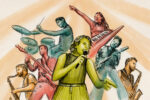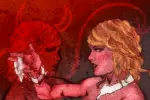At every concert, Tyler Joseph, the lead vocalist and songwriter of alternative band twenty one pilots, asks the crowd how many of them have experienced a twenty one pilots concert before. As the lights lift, so do people’s hands, speckling the crowd from the pit to the balconies. He nods, smiles, and offers a word of welcome into the microphone over the inviting roar of the remaining fans.
As the applause quiets, Joseph asks again for a show of hands, this time from the veterans, whether this is their second twenty one pilots show or their seventh. Clusters of eager hands pop into the air, rivaling, if not outnumbering, those of the newcomers. Joseph’s face splits into a proud, almost fatherly grin and, struggling to make himself heard over the cheers of veterans and newcomers alike, welcomes the veterans back home.
Ever since hearing about the band back in late 2015, I’ve been to three twenty one pilots shows on their two respective tours. Before attending the third show, I had tickets for the fourth show purchased, and I plan to attend every show of theirs that I possibly can. Am I just fanatical? Overly obsessive? Awful at money management? Maybe — but I’m not alone.
Every twenty one pilots fan I know, whether in person or through the internet, has either seen them more than once or actively plans to. I know people who have seen them more than six times, and are as excited for each concert as they were for the first.
Why do so many people spend time (and considerable amounts of money) to experience twenty one pilots’ shows over and over again? I can only really speak for myself, but I trust that other fans would agree with me when I say that it’s because their concerts, as Joseph says, are home.
Meaning to Fans
This sense of “home” is created through many vehicles, but the most notable (and perhaps obvious) one is the band’s meaning to the fans. Joseph and the drummer, Josh Dun, use the music as an outlet for their own struggles with mental health.
While Joseph as primary songwriter, is aware that his listeners benefit from the lyrics, he writes these lyrics primarily for himself, to help cope. The rawness and reality of his struggles translates spectacularly into the music and resonates strongly with fans.
The band approaches mental health issues from a place of truthful optimism, not shying away from the dark reality of the matter but also not wallowing in the gloom mental health issues can bring. They offer hope without sugarcoating their experiences, which drew me to them originally.
Their music and lyrics, approaching mental health issues as they did, gave me a voice regarding mental health at a time when I had none, and put into words the things I needed to say when I didn’t know how to say them. While I am grateful for Joseph’s and Dun’s role in creating this music, I am more attached to the songs themselves, as they were anchors for me in stormy times.
Their 2012 album, “Vessel,” is in particular packed full of anthems like “Holding On To You” and “Trees” that carried me through dark patches in my life, and I know they’ve done the same for others.
Hearing these songs, which are anthems to me, played live — and echoed loudly and passionately by thousands of people around me — gives such a profound sense of unity and home that I can’t even begin to put it into words.
Concert Experience
This sense of unity ripples throughout the fans, not only while singing the songs together but also while outside in line. We are all joined in our respective fights against mental illness, and that understanding creates a sense of camaraderie that is unique, in my experience, to a twenty one pilots concert. These shows are a refuge for us, and Joseph and Dun treat it as such.
To help understand and overcome the struggles of mental illness, Tyler relies on his faith in Jesus Christ, and has expressed before that his faith is inextricably tied to and woven into his music. This weaving of faith transfers to the concert experience and helps create that atmosphere of love. There are many moments during the Bandito tour, their latest expedition for their most recent album “Trench,” where Joseph, kneeling or standing with his eyes shut and arms outstretched, appears as though he’s praying over us.
I follow the Christian faith, so this expression is incredibly impactful to me, but whether you are religious or not, that gesture (if you interpret it as prayer or something similar) is still very meaningful. He is offering his fans one of the highest forms of kindness and love he can imagine, and that love is felt, whether it is interpreted as prayer or not.
Additionally, the two performers are very courteous and understanding of fans’ safety and experiences. Joseph has, on multiple occasions, paused shows to ask fans if they need anything or to urge security to give fans water or escort them out of the pit if necessary. He’s also structured the show so fans will have chances to sit down and rest their feet (an idea, he says, that was suggested by his father).
This kindness, from Joseph to the fans, is mirrored from the fans to each other. There are rarely any problems like frenzy, violence or sexual harassment in the pit, and the line outside the venue prior to the concert’s start feels more like a family reunion than a fight to get the best seats.
Both the listening and concert experiences combine to create this powerful sense of home that sweeps over everyone who attends a twenty one pilots show. It’s that vulnerability and sense of home created by the lyrics, the band’s tangible love for their fans, and the concert experience itself that keeps fans coming back, and, as I see it, will keep them coming back as long as twenty one pilots tours.
















